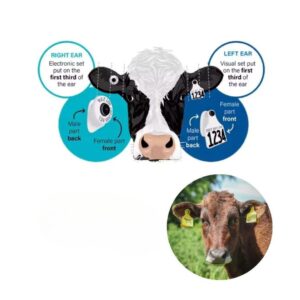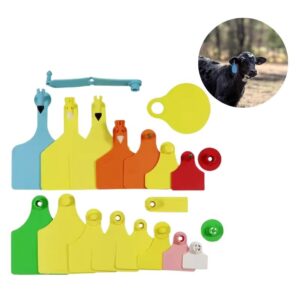Understanding Cattle Identification Methods
Tagging cows is a crucial identification method for cattle management, but many farmers and animal welfare advocates are concerned about its impact on animal well-being. This comprehensive guide explores the effects of ear tagging on cattle, best practices for minimizing discomfort, and the importance of proper techniques in ensuring effective identification and animal welfare.
The Impact of Ear Tag Application on Cattle
Ear tag application is a painful procedure that causes temporary discomfort to cattle. However, the pain is brief when done correctly, and the wound-healing process progresses without complications. Research has shown that proper tag placement and technique are crucial in minimizing pain and preventing complications.
- Initial pain lasts 1-2 minutes
- Complete healing occurs within 2-3 weeks
- Proper placement reduces healing time
- Modern tag designs minimize tissue trauma
Best Practices for Tagging Cows Management

Proper technique and timing are essential for successful ear tagging:
- Tag placement should be in the middle of the ear, between the two prominent cartilage ridges
- Tags should be applied when calves are young (ideally within the first few weeks)
- Clean equipment and proper hygiene are crucial
- Use appropriate tag size for the animal’s age
Monitoring and Care After Tag Application
Regular monitoring of ear tag wounds is essential to ensure proper healing and detect any complications early:
| Timeline | What to Monitor |
| Day 1-3 | Signs of excessive bleeding or swelling |
| Week 1 | Initial wound healing and inflammation |
| Week 2-3 | Complete healing and tissue recovery |
The wound healing process should be carefully monitored, particularly in unweaned dairy calves, which may be more sensitive to the procedure. Watch for signs of:
- Excessive swelling
- Purulent discharge
- Tissue deformation
- Tag rejection
To minimize discomfort and promote proper healing, consider these best practices:
- Use high-quality, appropriate-sized tags
- Apply antiseptic before and after tagging
- Choose calm, dry weather for tagging when possible
- Handle animals calmly and gently

Identifying cattle by ear tagging remains the most practical and widely used method in modern farming. While the procedure does cause temporary discomfort, proper technique, and aftercare can significantly reduce stress and promote quick healing. When comparing ear tagging to alternative methods like nose rings or injectable transponders, ear tags provide the best balance of visibility, permanence, and animal welfare. For optimal results, farmers should:
- Invest in quality tagging equipment
- Train staff in proper application techniques
- Maintain detailed records of tagging procedures
- Regular monitor tagged animals for complications
Successful Tagging cows’ success lies in proper planning, execution, and aftercare. Farmers can ensure effective cattle identification by following these guidelines while maintaining high animal welfare standards. Remember that adequate tag placement and technique minimize discomfort, improve tag retention, and reduce the need for replacement tags in the future.
